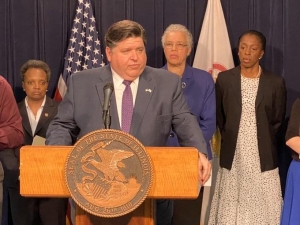
By Illinois Radio Network
SPRINGFIELD – Houses of worship across the state are planning to hold Easter and Passover services online to comply with Gov. J.B. Pritzker’s stay-at-home order, which was implemented to curb the spread of COVID-19.
A constitutional attorney said not allowing congregations to gather for worship crosses the line.
Earlier this week, Illinois Department of Public Health Director Dr. Ngozi Ezike urged religious leaders not to bring their congregations together under the same roof.
“Many people are celebrating the most important event of their faith this week, but the services must be held online,” Ezike said.
She said such a move will help reduce the spread of the novel coronavirus.
KrisAnne Hall, a constitutional attorney, said the First Amendment makes church a place for people to discreetly go and find faith and compassion without government interference.
“A church being relegated to online service is not only government defining church, but government cutting the legs out of the essential services of the church,” Hall said.
Hall said it also makes no sense to her that a hardware store remaining open with six-foot spacing guidelines is more essential than a church that could also follow such guidelines during services.
Pritzker said his order means people should exercise their faith virtually and not travel to visit with family.
“This will not last forever, but this is one Easter, one Passover, that you’re going to have to do something unusual in the way that you worship and I ask that you do that for all of us,” the governor said.
He also suggested using the online video chatting program Zoom to congregate.
“A funny term I’ve heard for a Passover Seder, ‘a Zader,’ ” Pritzker said.
Hall said government enforcing limits on assembly goes against what she called fundamental First Amendment rights of assembly and religion.
“So when you have a government that can define what assembly can be and to say ‘to step outside of those parameters of assembly will find you in jail,’ is a government that can create despotic laws and then eliminate the opposition to those despotic laws,” Hall said.
Illinoisans have been under stay-at-home orders Pritzker issued March 21 and extended it from April 7 to April 30.
That governor’s executive order limits gatherings of no more than ten people but “does not otherwise prohibit religious activities and specifically allows religious organizations to provide food, shelter, and social services, and other necessities of life, to its congregants and needy individuals.”
Illinois Radio Network can be reached at [email protected].






